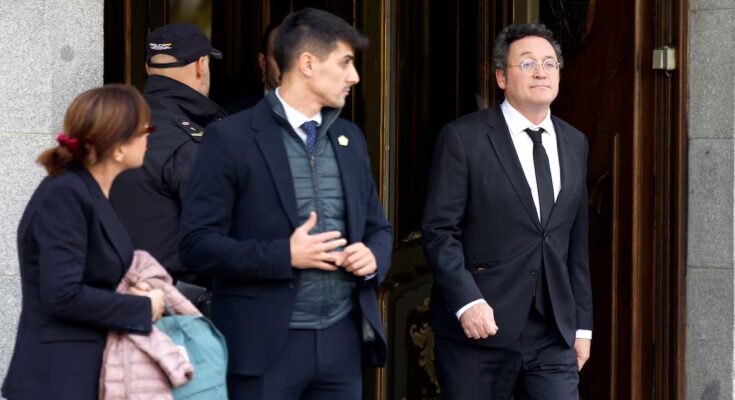Prosecutor Francisco Javier Montero asked the question bluntly:
– Was that source the State Attorney General?
And Miguel Ángel Campos, journalist specializing in courts at Cadena SER, responded without further additions, in front of the seven members of the tribunal that judges the head of the Public Prosecutor, Álvaro García Ortiz, in the Supreme Court:
-NO.
Campos was the first journalist who, around midnight on March 13, reported the existence of an email sent by the lawyer of Isabel Díaz Ayuso’s partner to the Economic Crimes Prosecutor of Madrid in which he admitted that his client, Alberto González Amador, had committed two tax crimes. This leak is the cornerstone on which the Supreme Court prosecuted the State Attorney General for the crime of revealing secrets. But the journalist, as he had already done before the investigating judge of the case, assured in the trial hearing on Tuesday that a source had informed him of the existence of that communication from González Amador’s lawyer several hours before García Ortiz accessed it. In the same hearing on Tuesday, another journalist, José Manuel Romero, deputy director of EL PAÍS at the time of the events, stated that he knew in advance from sources other than the public prosecutor that the legal representative of Ayuso’s boyfriend had offered a deal to the Public Prosecutor, subject to recognition of his tax fraud.
Campos relied on his constitutional right to preserve the secrecy of sources. And he vehemently defended the rights of journalists. He said this was a guarantee that “society has the right to truthful information” and that the media does not simply act as a “spokesperson for power”.
In an intense cross-examination by the public prosecution lawyer, Gabriel Rodríguez-Ramos, the witness explained in detail his actions on March 13, 2024, the day in question, “a crazy day,” in his words. After Eldiario.es When the prosecutor’s complaint against González Amador was published, the journalist said he began making multiple efforts to try to verify the news. Around 3pm, one of his interlocutors summoned him to his office after announcing that he had relevant information. According to Campos, this source showed him the lawyer’s email in which, after learning of the facts, he offered a deal to the Prosecutor’s Office and allowed him to take notes, without handing it over. But when the SER journalist was already returning to the editorial office, he called him to tell him that he couldn’t use it because it contained personal data and he didn’t know how many people could have access to it.
The informant states that throughout the afternoon he tried to verify information from other sources. “I called judges, prosecutors, people from the Treasury Ministry, from the State Attorney’s Office,” he specified, without obtaining the confirmation he was looking for. After 9.30pm that day, while at a bar watching a football match, Campos said he received a call from a colleague to tell him that The world had just published that it was the Public Prosecutor’s Office that had offered González Amador a deal. The journalist told his radio colleagues that the information was “false” and began to proceed to confirm again that he was not authorized to disclose the information.
Campos admits that he called García Ortiz at 9.38pm, but that he did not answer or return the call. From the telephone company report it appears that the communication lasted four seconds, the time, according to the witness, in which the mailbox rang. “García Ortiz would have to be a marvel to tell me the email at that moment,” quipped Campos.
The informant reported that he continued to insist and was able to contact the first source who showed him the email. And who finally convinced him to authorize him to disclose its contents. It was, therefore, 11.25pm when he entered the Hora 25 program to tell it. And a few minutes later, at 11.51pm, he published it on the Cadena SER website.
After Campos, journalist José Manuel Romero, deputy editor of elDiario.es, who was deputy editor of EL PAÍS, stated when the alleged leak occurred. Romero assured that he learned, at noon on March 12, 2024, from tax sources at the Superior Court of Justice of Madrid, that the lawyer of Ayuso’s partner intended to reach an agreement with the public prosecutor which implied that his client would repay what he had defrauded and recognize his crimes in exchange for a reduction in sentence which would result in the avoidance of imprisonment. The journalist explained that EL PAÍS did not publish this information at that time because he could not compare it with González Amador’s lawyer, Carlos Neira, who did not respond to the call, email and WhatsApp message sent by an editor of the Madrid section.
Romero relied on professional secrecy to not reveal the source who provided him with this information, but located it in the area of the Community Prosecutor’s Office of Madrid. The editor explained that he contacted this source on March 12 to counter the message that the Madrid president had published on the social network
The person he spoke to assured him that the complaint published by the Ministry was not due to a “political hunt” and that, proof of this, is that the lawyer Neira had contacted the Public Prosecutor to seek an agreement on his client’s crimes and had shown himself willing to pay a fine to reduce the prison sentence that the Prosecutor’s Office could have requested. That source also provided him with the name of the lawyer Neira, which had not been published until then.
This information, the journalist said, led him to ask the Madrid branch to try contacting the lawyer to confirm that he was negotiating a deal. All this results from the messages exchanged between the editors, incorporated into the case by notarial deed. In one of those messages, Ferrero wrote to Peinado: “Romero tells me to look for the telephone number of Carlos Neira, who apparently is the lawyer of Ayuso’s partner. Who apparently showed up this morning saying that he will pay, that is, acknowledging the crime.” The editor tried to locate the lawyer by phone, email and WhatsApp, but got no response and the newspaper did not publish the story, Romero said.
Romero also recounted the contacts that another EL PAÍS editor, Juan José Mateo, had with Ayuso’s chief of staff, Miguel Ángel Rodríguez, on the afternoon of March 13, hours before the email whose leak is being investigated reached the attorney general. Rodríguez told this editor after 7:30 p.m. that the Prosecutor’s Office had proposed a deal to the defense of González Amador, information that The world published at 9.29pm This version contradicted what EL PAÍS had up to that point, so Romero, according to what he said during the trial, tried to confirm it with the press chief of the TSJ Prosecutor’s Office, but the latter told him that he could neither ratify nor deny it. The deputy director then called the press secretary of the Attorney General’s Office, who also said she could not confirm this but that a press release would be prepared to clarify the situation.



